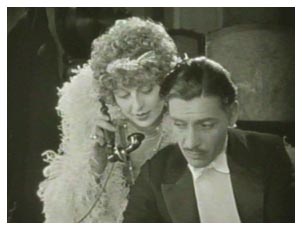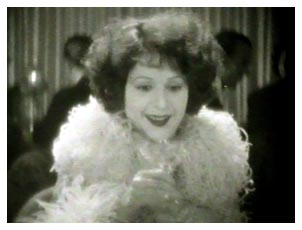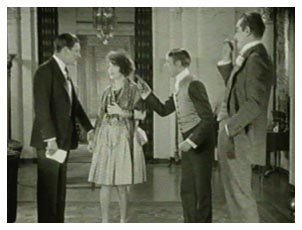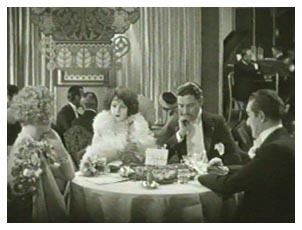

Norma Talmadge Productions
Distributed by First National Pictures
Cast: Norma Talmadge (Kiki), Ronald Colman (Victor Renal), Gertrude
Astor (Paulette), Marc McDermott (Baron Rapp), George K. Arthur
(Adolphe), William Orlamond (Brule, the doorkeeper at the theatre),
Frankie Darro (Pierre).
Kiki is a Parisian gamine who wants to break into the chorus line at the theatre where she and paperboy Pierre hang out. She succeeds in getting hired when an opening occurs and she is able to secure another dancer's letter of recommendation from "the Agency." She falls in love with the theatre manager , Renal, although he is romantically involved with Paulette, who is the star of the show. On opening night, Kiki makes a shambles of things as she does not follow the chorus line, steals the show from Paulette, and falls through the harp in the orchestra pit. When she receives her dismissal letter, she goes to Renal's office, succeeds in causing a row between Renal and Paulette, and, in retaliation again Paulette, he takes Kiki to dinner. After a disastrous dinner where Paulette also shows up with Baron Rapp, Renal tries to take Kiki home, but she has been kicked out of her flat for not paying her rent. He takes her to his home and tries to kiss her, but she slaps him and runs into his bedroom locking the door. He allows her to stay for days afraid that she may commit suicide by jumping in the Seine. What he doesn't know is that Kiki is intercepting a series of letters of apology that Paulette has been sending to the house. When her deception is discovered, Paulette and Renal appear to be making up. To make matters worse, Rapp tells her that Renal wants to be rid of her and has asked him to take her away. Can Kiki tear herself away from the man she loves . . . and can she win him away from Paulette?
"Miss Talmadge is a good actress. She has power, she
has poise and she possesses a delicate subtlety of expression.
But her undeniable talent had been guided into false channels;
she had become a box-office star, devoting herself to standard,
stereotyped emotional roles which permitted her to wear a given
number of fashionable gowns, and to occupy a given number of close-ups.
She had become terribly monotonous," said critic Robert Sherwood
in 1923. (1)
This type of criticism may have been weighing on Talmadge's mind when she decided to step out of the dramatic roles she was so well-known for to do something new and different in 1926 - "Kiki."
The film makes for 96 minutes of enjoyable entertainment with many smiles mixed in with a few hearty laughs; however, there are some things about the production that cause us to hold back from a completely satisfying experience.
The original story is the creation of Andre Picard who published his novel of the same name in 1920. David Belasco had a very successful stage production of the story with the popular stage actress Lenore Ulric in the lead, so it was only natural that Talmadge would pick up on this tale for her debut as a comedienne. Without a doubt, Talmadge was considered one of the best dramatic actresses of the silent era (although it's unfortunate more of her output is not available for home viewing today). In "Kiki," she proves she can handle comedy with naturalness, exuberance and perfect timing.
One of the highlights of Talmadge's performance is the opening night of the stage production in which she has wrangled a place in the chorus line. As the curtain rises, it stops only a few feet off the floor to reveal approximately 40 pairs of shapely, dancing legs. It then rises to full heights, and we see an impressive production that would do credit to the Rockettes. However, this doesn't last long. We soon learn that one of those pairs of legs belongs to Kiki who is on the far left. At first, she is performing well and keeping time with the others - but when the line begins to move to the front of the stage and then back again, Kiki is more entranced with the audience than staying in line with the others. When the girls move to the back of the stage, she gets out of sync and stands on the edge of the orchestra pit dancing while the other girls are behind her. The stage manager tries to grab her with a hook, but, in evading the hook, she crosses in front of the show's star, Paulette, and far away from where she should be in the line. Another grab with the hook from the other side of the stage is missed by the stage manager. In trying to avoid being jerked off the stage, Kiki accidentally falls in to the orchestra pit, head first through the strings of the harp. Remaining composed, she gets back on stage and continues to dance, but she doesn't notice the chorus line and Paulette moving back so the curtain can close. Kiki is left in front of the curtain as the number comes to an end - seemingly enjoying the raucous laughter she has caused. Furious, Paulette reaches through the curtain to pull Kiki back -- but only succeeds in ripping off Kiki's short skirt. Finally, behind the curtain, Kiki and Paulette begin to fight. However, when the curtain goes up for a curtain call - the timing is perfect - they suddenly stop fighting and begin to bow. Down comes the curtain, and they fight again. Theatre Manager Renal comes to break up the fight, and the three get caught in this routine of lashing about and stopping suddenly to bow when the curtain goes up each time.
Following this disastrous stage debut, Kiki receives her written notice from Renal that she has been fired. She goes to his office and finds herself in the middle of a fight between Renal and Paulette. When Paulette storms out, Kiki convinces him to take her to the restaurant where he and Paulette had planned to go rather than cancel the date. After dinner, she tells him she has no home to go to having been thrown out of her flat. Sympathetic, he takes her home with him. Howeve, at Renal's residence, she repulses his romantic advances and locks herself in his bedroom. Days pass as she continues to live in his house, and he is afraid to put her out for fear she'll drown herself in the Seine.
This lays the groundwork for another comedic highlight for Talmadge. When Kiki threatens Paulette with a knife, Renal has had enough and orders her out. Kiki collapses on the floor. The next scene shows a very rigid Kiki lying stiffly on her back on the divan, obviously unconscious. The doctor diagnoses catalepsy and demonstrates by holding up her arm, separating her fingers and other maneuvering of her limbs - all of which remain stiffly where he places them - to demonstrate her condition.
It must be interjected at this point that one of the tour de forces in this film is George K. Arthur's performance as Renal's prissy valet (his hairdo alone is a riot!). He and Kiki fight constantly, although Arthur's character, Adolphe, is afraid of her. When he complains that she is eating the master's breakfast, she slaps him. When it appears at one time that she is leaving, he practically runs to get her large steamer trunk -- only too happy to take it out for her. He also knows that Kiki is intercepting all of Paulette's letters asking Renal for forgiveness but, out of propriety - or fear - does not tell his master.
One of Arthur's funniest moments is during the catalepsy sequence. The doctor, to demonstrate a complete absence of feeling during catalepsy, suggests that Renal stick a pin in Kiki's leg. (It is at this time we see Kiki lift one eyelid making it perfectly obvious she is faking the condition.) Paulette is only too happy to furnish a very large and long hatpin. When Renal can't bring himself to do it, Adolphe giddily offers to do the deed. With a big smile on his face, he draws his arm back to full extension so that he can ram the hatpin in her leg - unable to bear the thought, the maid screams and Renal grabs Adolphe's arm. The delight Arthur exhibited at having revenge on Kiki when she is unable to retaliate is hilarious.
Talmadge is actually amazing in her portrayal of this rigor
mortis-like state. With everyone else gone, Paulette complains
that Kiki is lying on her wrap. Renal pick he up and places her
across a  chair with two wooden arms. Talmadge,
surprisingly, rest perfectly prone on her back on these thin wooden
extensions, arms down her side and legs straight out - she doesn't
even appear to shake or move at all! At one point, Renal stands
her up and tries to reach for his coat on a chair which is too
far away. Of course, when he lets go of her and moves away, she
starts to fall forward with Renal catching her each time at the
last moment. Keep in mind that Talmadge has her eyes closed and
is holding herself perfectly rigid. Obviously there was a great
deal of trust in Colman catching her, and Talmadge does a superb
job of keeping the catalepsy pretense believable.
chair with two wooden arms. Talmadge,
surprisingly, rest perfectly prone on her back on these thin wooden
extensions, arms down her side and legs straight out - she doesn't
even appear to shake or move at all! At one point, Renal stands
her up and tries to reach for his coat on a chair which is too
far away. Of course, when he lets go of her and moves away, she
starts to fall forward with Renal catching her each time at the
last moment. Keep in mind that Talmadge has her eyes closed and
is holding herself perfectly rigid. Obviously there was a great
deal of trust in Colman catching her, and Talmadge does a superb
job of keeping the catalepsy pretense believable.
By the way, one recurring bit of business is a delight and, in spite of occurring several times in the movie, is amusing each time. Whenever Kiki wishes to "primp" -- for example, before going to the restaurant with Renal -- she reaches into her small purse, removes a huge powder puff that appears to be far too large for the purse, shoves it inside her blouse until her hand and the powder puff disappear, pats the powder on both sides (with dust rising) and then crams it back into the purse. Not a big laugh, but the kind of "business" that keeps us smiling.
Enough can't be said about the choice of Colman for the role, too. He had just completed two pictures in 1925 with Norma Talmadge's sister, Constance ("Her Night of Romance" and "Her Sister From Paris"), and he proved himself very capable of serving as a comedy foil - while still exuding his trademark dignity - in all three films. As anyone who has seen a Colman sound film knows, his voice was the epitomy of English elegance. However, he exhibited that same elegance without sound in the silent films he made. With Talmadge in "Kiki," he is a calm and assured theatre manager who finds the street gamine amusing. With the fiery tempered Paulette, he is understanding and patient with her volatile personality. With Kiki, he, at first, is the perfect romantic, although he finds it's like making love to a bobcat. Later, he is frustrated by her erratic behavior and refusal to be reasonable. Finally, he is firm and authoritative as he has finally had enough and orders her to leave. When he thinks she is ill, he is compassionate and caring. One doesn't think of a secondary role in a comedy being very demanding, but few could have succeeded in this role as well as Colman who gives it exactly what it needs to succeed.
The flaws in the film are in the story, not in the performances. Hans Kraly did the screenplay adapting it from Picard's story and the Belasco stage play. He is credited with developing a witty adaptation, and it is. However, there are many times throughout the story when Kiki is annoying or simply easy to dislike. For example, she gains a place in the theatrical revue based on her voice - which everyone agrees is remarkable. She actually gets a round of applause from the other chorus girls when she auditions - an amazing feat considering the supposed jealously and "cattiness" of the ambitious girls toward one another. (It is difficult to understand how she earns a place in the chorus line based on her singing - she is never asked to dance as a part of the audition.) At any rate, it is puzzling how she could go through what must have been weeks of rehearsal only to appear onstage opening night and have no clue as to what she is supposed to do. Not only that, she doesn't appear to be upset at her mistakes - only enamored with being onstage in front of the audience.
At times we are sympathetic with her unrequited love for Renard - a man who is far above her station - yet her methods for winning his love are at times annoying and difficult like. When Renal takes her back to his home after a night at the restaurant, she allows him to give her a light "peck" on he lips after he asks if she's ever been kissed by a man. When he grabs her to kiss her passionately, she slaps him and runs to the bedroom where she locks herself in. OK. That's understandable. She wants to be more than a "one night stand," so we sympathize that she intends to make him love her. What is puzzling is her angry (at least to him) comment from behind the door: "You're lucky. Last time a man tried that - I knifed him through the heart." This vicious nature reveals itself later when Kiki argues with Paulette, pulls a knife and threatens her rival with it. No wonder Renal orders her to leave when he walks into the room and observes this behavior. Earlier, when Renal is trying to talk to Paulette on the phone, Kiki makes all sorts of racket and noise to interfere with the conversation. We understand why she is doing it - it's just that the sequence isn't funny - it's annoying.
Kiki does win our heart and elicits our compassion at times in the film. Before turning violent and waving a knife at Paulette, she pleads, "Life wouldn't stop for you if you lost him - it would for me. That's real love - something you'll never know, " and adds, "I can't help how much I love him . . . "
 In another sequence, it appears
Renal and Paulette have made up in the other room. Kiki is with
Baron Rapp, the elderly roué and financier of Renal's production.
He tells Kiki that Renal does not want her there any longer and
wishes him to take her away. He promises to shower her with anything
she wants. Obviously heartbroken and not moved by the anticipation
of "riches," she looks sadly at Rapp and asks, "When
he sees me - all dolled up - stepping into your car - do you think
he'll care - 'cause he lost me?" A touching scene.
In another sequence, it appears
Renal and Paulette have made up in the other room. Kiki is with
Baron Rapp, the elderly roué and financier of Renal's production.
He tells Kiki that Renal does not want her there any longer and
wishes him to take her away. He promises to shower her with anything
she wants. Obviously heartbroken and not moved by the anticipation
of "riches," she looks sadly at Rapp and asks, "When
he sees me - all dolled up - stepping into your car - do you think
he'll care - 'cause he lost me?" A touching scene.
The best, though, is at the end, when, still posing catalepsy, Kiki kisses Renal quickly when his face comes close to hers - then just as quickly reverting to her cataleptic ruse. When Paulette leaves, she opens her eyes. Renal asks her, "Why did you kiss me?" She looks lovingly at him and says, "Because I've wanted to for along time." The next bit of dialogue is even more touching. Throughout the film, Renal pulls a chemise out of his jacket pocket every time he goes for his handkerchief. As he continues to hold her, he, once again, goes for a handkerchief with the same result. "Why do you put these ridiculous things in my pockets?" he asks her. "So you might think if me - once in awhile," she replies.
One of the most successful actresses of the silent screen, Talmadge is overshadowed by many of her contemporaries mainly because so little of her work has received the attention that it deserves. Yes, an occasional film pops up at film conventions, and an occasional videotape has surfaced in not so pristine form - but Kino's 2010 release of the double feature DVD "Kiki" and "Within the Law" (1923) is the first quality release of her work to come along for home viewers. Some of the figures from her career attest to her popularity. In 1919, she earned over $1.2 million from First National for eight pictures. The next year, she was earning $350,000 per picture and a percentage of the profits. In 1923, she was named the number one box office draw - an impressive achievement against such competition as Mary Pickford, Charlie Chaplin, Douglas Fairbanks, Gloria Swanson and more. Her director in "Kiki," Clarence Brown, said, "Norma was the greatest pantomimist that ever drew breath. She was a natural-born comic; you could turn on a scene with her and she's go on for five minutes without stopping or repeating herself." (2) "Kiki" was a critical success; however, it apparently was not a box office success. (3) Her career never regained the momentum is had enjoyed for the past 11 years. Subsequent films such as "Camille" (1926), "The Dove" (1927) and "A Woman Disputed" (1928) were not well received. Some say United Artists' distribution problems were much to blame for Talmadge's loss of popularity. She only made five more films after "Kiki" - the last two disappointing talkies. She walked away from films after that remaining a wealthy woman for the rest of her life.
Colman, of course, went on to an even more successful career in sound films because of his most elegant voice. His popularity actually increased during the thirties and forties, and he continued making films until 1957 with many radio and TV appearances to his credit, as well. As noted, he does a superb job as Renal in this film; however, in this reviewer's opinion, he is even more enjoyable opposite sister Constance Talmadge in "Her Night of Romance" and "Her Sister From Paris."
Kudos are also due to Gertrude Astor for a fine job as Paulette. She is most animated as the exasperated diva, and can turn on the charm convincingly for Renal, although she has just been kissing another man. We aren't meant to like her character, but it's difficult to dislike her, either - it's such a good performance.
Marc McDermott is well-cast as the leering Baron Rapp who appreciates a beautiful girl. When Kiki completes her singing audition and everyone applauds, Renal asks Rapp what he thinks of the performance. Rapp replies, "Very shapely! Very shapely!"
Frankie Darro has a small part at the beginning as a paperboy and Kiki's friend. He gives a spirited performance as the one who encourages her to try out for the revue and contrives a stunt to draw the doorman away so Kiki can get inside the theater.
Harrison's Reports said the film was "Very amusing,"
and "It should give good satisfaction everywhere." The
review went on to say that, "The picture is full of comedy
from beginning to end, of the light sort mostly, and of the side-splitting
occasionally. . . The acting of he supporting cast . . . is very
good." (4)
The New York Times said, ". . . the picture is nevertheless consistently amusing except in those episodes where either the fun is too wild or it suffers through repetition of action." Regarding Talmadge, the reviewer states, "Norma Talmadge proves herself an ingratiating and clever comedienne in the role of he quick-witted little waif . . ." All of the supporting cast were praised, as well. " . . .Ronald Colman . . . gives a restrained and charming performance." George K. Arthur "adds much to this production." "Mr. MacDermott gives a good performance," and "Paulette . . . is played in fine style by Gertrude Astor." (5)
Variety added its praise, too, noting, "'Kiki' has made a whale of a good comedy, not as well suited to Miss Talmadge as many other vehicles, but so filled with situations, slapstick and laughs that in its present excellent scenario form, there's not a chance of its flopping before a real audience." (6)
As noted, "Kiki" has gotten a well deserved revival in Kino's 2010 release - a restoration by the Library of Congress using material from the Mary Pickford Collection and the Raymond Rohauer Collection. Brought together from three incomplete copies in English, French and Czech. Norma Talmadge expert Greta de Groat (don't miss her Norma Talmadge website at http://www.stanford.edu/~gdegroat/NT/home.htm) participated in the translation of the French intertitles with Derek Boothroyd. Apparently there were some differences in storyline between the English and French prints. However, the final product is a joy to watch and flows naturally and logically.
References:
1. Sherwood, Robert. The Best Moving Pictures of 1922-1923.
Boston: Small, Maynard and Company, 1923.
2. Brownlow, Kevin. The Parade's Gone By. New York: Bonanza
Books, 1968.
3. Koszarski, Richard. An Evening's Entertainment: The Age
of the Silent Feature Picture, 1915-1928. Berkeley: University
of California Press, 1990. pg. 283.
4. Harrison's Reports. April 10, 1926.
5. Hall, Mordaunt. The New York Times. April 6, 1926.
6. Variety. April 7, 1926.
Copyright 2011 by Tim Lussier. All rights reserved.